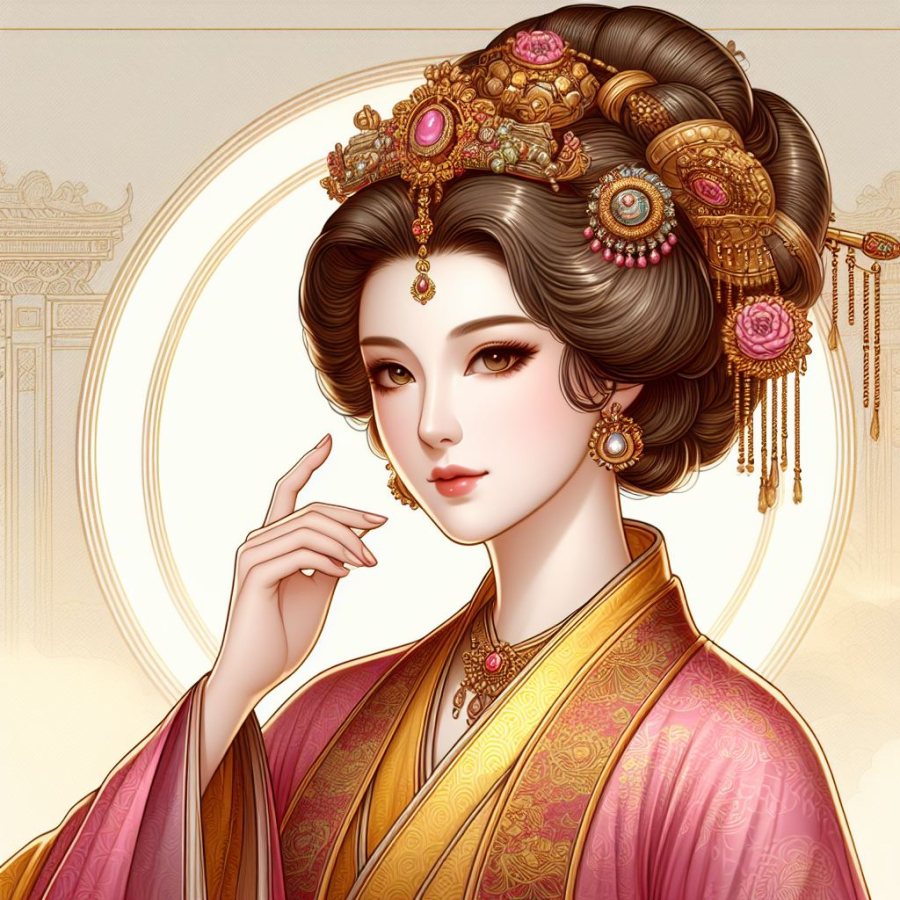In the feudal era of China, the value of women’s chastity was highly regarded. Especially, the women chosen to enter the royal palace should respect this value above all. Only those girls who still had their “thousand golds” intact were eligible to serve the emperor and the concubines. If they were lucky enough to be favored by the emperor, they would have the opportunity to change their lives, from a step foot to a phoenix.
However, Chinese history witnessed an exception, when a married woman was chosen as the empress. That was Empress Huo Cheng, also known as Empress Huo Cheng Thai, the second empress of Emperor Han Cheng Liu Hai. She was the birth mother of Emperor Han Vu Liu Trieu, a famous figure in Chinese history.

Give up family, husband and children to enter the palace
According to Tu Ma Trinh’s hidden historical record, Empress Huo Cheng was named Vuong Chi. In the book Han Vu Co Su, she was referred to as Xu Nhi, and the book Tinh Thi Thu Bien Chung stated that she had the courtesy name Chi, pen name A Du.
She came from Huu Phu Phong, Hoe Ly village (now belongs to Ham Duong, Thiem Tay). Her father was Vuong Trong, her mother was Tang Nhi, the grandson of Yen Vuong Tang Do in the Han So period. Her parents had 3 children, after her father passed away, her mother remarried the Dian family in Truong Lang and gave birth to 2 more sons.
Vuong Chi then married Kim Vuong Ton, who lived near her house and gave birth to a daughter named Kim Tuc. Kim Vuong Ton was just an ordinary family, while Vuong Chi’s family had noble origins. Although the family status declined, her mother still wanted her daughter to marry into a noble family.
One day, Vuong Chi’s mother invited a fortune teller to read the family’s destiny. The fortune teller said that Vuong thi had a prosperous destiny, so her mother called her daughter back and asked her to divorce Kim Vuong Ton. The Kim family objected and refused to do the procedure. Tang Nhi kept her daughter at home, secretly hiding this marriage and allowing her to enter the palace to serve Prince Hoang Thai Liu Hai. Vuong Chi was later honored as a beauty.
Vuong Chi was famous for her enchanting beauty, captivating colors, just a blink of an eye, enough to make people infatuated for a lifetime. With her beauty and talent, this beauty was greatly loved by Liu Hai.
In the 7th year of Hau Nguyen in the reign of Han Van De (157 BCE), Han Van De passed away. The following year (156 BCE), Liu Hai ascended the throne, that is, Han Cheng De, and appointed Princess Bao Thi as the empress. Vuong thi gave birth to 3 princesses so she was appointed as the wife. Later, she gave birth to the 11th prince, namely Liu Trieu. This is her youngest son, and also the only son.

Seizing the throne for her son through deep schemes
After being born, Liu Trieu was always loved by Han Cheng De more than other princes. In the 4th year of the Pre-Yuan period under the reign of Han Cheng De (153 BCE), Han Cheng De appointed Liu Vinh, the son of Lich Co, as the crown prince. In the same year, Han Cheng De appointed Liu Trieu, who was only 4 years old, as Giao Dong Vương. According to the regulations of the Han dynasty, the mothers of the vassal princes were only appointed as empresses after the emperor’s death, but the wife was favored by the emperor and was honored as Giao Dong Vương Thai hậu.
The story of how Giao Dong Vương Thai hậu helped her son Liu Trieu ascend to the throne is most widely known through the famous story in Han Vu Co Su. At that time, the sister and mother of Han Cheng De, Quan Dao Princess Liu Phieu, wanted to marry her daughter Tran thi to crown prince Liu Vinh, but Lich Co rejected it in a rude way. This angered the princess, so the princess turned to negotiate a marriage with Giao Dong Vương Thai hậu. At that time, Vuong thi wanted to find a support, so she accepted the invitation to marry the princess to marry. Obviously, the princess supported the future son-in-law to succeed the crown prince, so that her daughter could become the crown princess, and later the empress of Dai Han.

Quan Dao Princess often praised Liu Trieu in front of Han Cheng De, making Cheng De more fond of Liu Trieu. Lich Co was favored, had a son as Crown Prince so he looked arrogant. Quan Dao Princess took this opportunity to satirize: “Lich Co and other nobles gather. Behind the back, often send palace ladies to use evil spells to curse.” Hearing this, Cheng De was not happy, but because of his love for his wife, he forgave Lich Co.
After that, the princess and Giao Dong Vương Thai hậu urged the ministers to submit a request to Han Cheng De to appoint Lich Co as the empress. The minister Dai Han followed suit and made this proposal to Cheng De. Cheng De was not pleased with Lich Co, thinking that Dai Han was instigated by Lich Co, so he was angry and sentenced Dai Han to death. At the same time, Cheng De issued an edict to dismiss Crown Prince Liu Vinh and demote him to Lam Giang Vương. Lich Co died resentful. In April, on the day of At Ty, Vuong thi was given the position of Empress. On the day of Dinh Ty, Liu Trieu as a dead body, was appointed as the Crown Prince by Cheng De.
In 141 BCE, in January, Han Cheng De died, Liu Trieu ascended the throne, that is Han Vu De. Vuong hoang hậu was honored as the Grand Queen. In the 3rd year of Yuan Soc (126 BCE), in June, on the day of Canh Ngo, Grand Queen Vuong thi abdicated, buried with Han Cheng De at Duong Lang, with the title of Queen Huo Cheng.



































